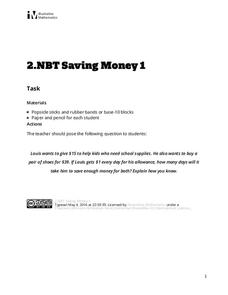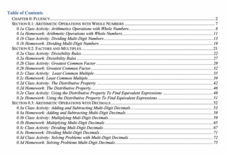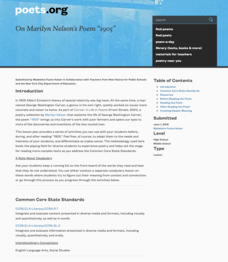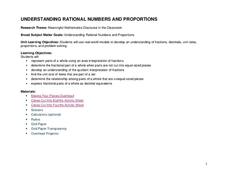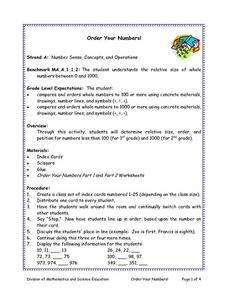LABScI
Genetic Equilibrium: Human Diversity
Investigate the Hardy-Weinberg Principle to explain genetic equilibrium. The 10th lesson plan of a series of 12 is a laboratory exploration of genetic equilibrium. Your classes use a mixture of beans to model allele and genotype...
Learning to Give
Create a Volunteer Spirit
Motivate young citizens to make a positive difference through volunteering. Scholars examine the local and school community to discover ways the class, as a whole, can volunteer their time to help one or the other, then reflect on their...
Illustrative Mathematics
Saving Money 1
How many days will it take Louis to save enough money for school supplies and new pair of shoes? Focus on Common Core math standards with a two-part task that involves a word problem and counting manipulatives.
iCivics
Lesson 2: Misinformation
Fake news is a hot topic right now ... but what is it? Intrepid young investigators track down the facts that separate journalistic mistakes and misinformation through reading, research, and discussion. Part three in a five-lesson series...
Social Media Toolbox
Twitter Time
Tweet all about it! Junior journalists explore the Twittersphere to determine its effectiveness as a news broadcasting tool in the 12th installment of the 16-part Social Media Toolbox. Participants follow and record their observations of...
Social Media Toolbox
Social Media Messages
What are the elements of a good social media post? The 13th activity in the 16-part Social Media Toolbox incorporates all of the typical components found in a Facebook or Twitter post. Scholars work together to create great posts based...
CK-12 Foundation
Equivalent Fractions
An interactive made up of five questions tests scholars' knowledge of equivalent fractions. Two fraction circles with moveable parts assist mathematicians in finding solutions. Questions are multiple-choice with one discussion.
Core Knowledge Foundation
Early American Civilizations Tell It Again!™ Read-Aloud Anthology
Bridge subjects ancient history and English language arts together with a unit all about the Maya, Aztec, and Inca civilizations. Eleven lessons begin with a read-aloud followed by a whole-class discussion in preparation for practice by...
Academy of American Poets
Teach This Poem: "Violin" by Nikki Wallschlaeger
Nikki Wallschlaeger's Violin is the featured poem in a activity that uses music and multiple readings to delve deep into its analysis. After a writing warm-up, learners watch and listen to a video that showcases Regina Carter...
Utah Education Network (UEN)
Fluency
Become fluent in the language of mathematics. Scholars learn to divide multi-digit whole numbers as well as see how to determine the greatest common factor and least common multiple. They also investigate how to apply the distributive...
Nemours KidsHealth
Obesity: Grades 6-8
Screen time and fast foods, sugary drinks and greasy fries have lead to one-third of tween and teens being overweight or obese. As part of the Health Problems Series scholars analyze the nutritional value of the school food services menu...
Health Smart Virginia
Ending the Silence on Mental Illness
To end the silence on mental illness, groups research a mental illness. They then create a scene-by-scene script, cast parts, and record a video that details the symptoms, causes, and treatment of the disorder. They also include what...
Academy of American Poets
Teach This Poem: "The Tradition" by Jericho Brown
To begin this lesson plan, class members examine Antonius Hockelmann's painting "Tree Flowers II," record elements of the painting that they notice, and share their observations with a partner. Next, pupils do a close reading of Jericho...
Academy of American Poets
On Marilyn Nelson's Poem “1905”
Marilyn Nelson's poem, "1905," asks young scholars to compare and contrast George Washington Carver and Albert Einstein. After studying images of the two scientists and listing their observations, class members listen to several readings...
Academy of American Poets
Teach This Poem: "Tamales on Christmas" by Christian Robinson
A lesson spotlights the poem "Tamales on Christmas" by Christian Robinson. Scholars discuss their favorite foods and then examine a lively picture of a family preparing tamales. After listening to the poem twice, learners participate in...
DiscoverE
Curious George Sailboat
A whole-group discussion kicks off a hands-on activity that challenges young engineers to build a sailboat using reusable materials. Participants gather recycled items to assemble their one-of-a-kind sailboat and test its ability to...
Curated OER
Drawing Body Parts
For this ESL worksheet, students read the words for 9 parts of the body. Students draw a picture to illustrate each word. This is for ESL students.
Curated OER
Fraction Circles
Fourth graders receive a fraction circle and show how each different part makes a whole. Students compare the different fractions that make up a whole. Students choose 2 fractions which are inside a bucket and they compare them both...
Curated OER
Understanding Rational Numbers and Proportions
Students explore parts of a whole. In this fraction lesson, students determine what makes a fair share. Working with manipulatives, students solve mathematical problems containing fractions.
Curated OER
To Be (Half) Or Not To Be (Half)
First graders demonstrate various ways to represent and verify a whole or set separated in two, three, or four equal parts. Using interlocking cubes, Students model a part of a whole or a part of a set. They use appropriate tools and...
Curated OER
Percent Box
Students examine the procedures to determine a number when the percentage of the whole is known or to find the whole number when the part or percentage is known.
Curated OER
Order Your Numbers
Students examine the order of whole numbers that range from 0 to 1,000. They compare and contrast the quantities of different numbers using the number line, objects, and symbols of comparison. Students also work as a class with cards to...
Curated OER
Technology Lesson Activity: Fractions
Fifth graders practice using the English measuring system by creating fractions. In this parts of a whole lesson, 5th graders combine math key bars to simulate small parts of a bigger item. Students combine the pieces to...
Curated OER
Unit II - Version 6.0 - Worksheet 1 - Fractions
In this fraction learning exercise, learners determine the number of parts in a whole. They add and divide fractions. This one-page learning exercise contains 11 problems.
Other popular searches
- Fractions Parts and Wholes
- Math Parts and Wholes
- Wholes and Parts
- Fractions Parts of Wholes
- Parts and Wholes Science


